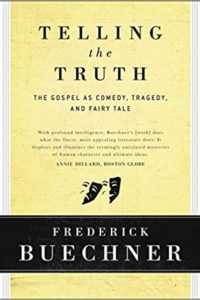Telling the Truth by Frederick Buechner
 This book is for preachers. Some of you just stopped reading—but may I suggest that we’re all preachers? Martin Luther said we are to preach the gospel to ourselves every day.
This book is for preachers. Some of you just stopped reading—but may I suggest that we’re all preachers? Martin Luther said we are to preach the gospel to ourselves every day.
In this little 1977 book, Frederick Buechner says the preacher’s task is to tell the truth (1) about the world around him, (2) about the sickness and need of our own hearts, (3) about the giddy laughter of a coming kingdom, and (4) about the final transformation that will one day be ours.
It’s called Telling the Truth: The Gospel as Tragedy, Comedy, and Fairy Tale.
Telling the Truth
Telling the truth begins with being honest. Putting words to the horror and the wonder of the world around us. Describing loves and hates, fears and anxieties, longings and doubts. Seeing “into the wordless truth of our lives.” (17)
It’s the art of using words well.
The Gospel as Tragedy
We begin with the bad news.
Silence, stench, emptiness, darkness. The preacher uses these colors to paint this canvas.
It must be painted well. The depth and detail here determine the exhilaration of the good news to come. The light shines brightest when it breaks through the deepest darkness.
If you have only a little cough, healing is small news. If you died from the ravages of cancer, new life is startling.
Buechner says it this way:
“Beneath our clothes, our reputations, our pretensions, beneath our religion or lack of it, we are all vulnerable to the storm without and to the storm within, and if ever we are to find true shelter, it is with the recognition of our tragic nakedness and need for true shelter that we have to start. Thus it seems to me that this is also where anyone who preaches the Gospel has to start too—after the silence that is truth comes the news that is bad before it is good, the word that is tragedy before it is comedy because it strips us bare in order ultimately to clothe us.” (33)
Jesus said it like this:
3 “Blessed are the poor in spirit, for theirs is the kingdom of heaven.
4 “Blessed are those who mourn, for they shall be comforted. (Mat 5:3-4 ESV)
The temptation is to just skip to the answer, but the good news is only truly good once we’ve understood the bad news.
The Gospel as Comedy
The good news of the gospel is so outlandish, the response is joy-filled laughter. It’s news that’s almost unbelievable because it sounds too good to be true.
“The Gospel is bad news before it is good news. Is the news that man is a sinner, to use the old word, that he is evil in the imagination of his heart, that when he looks in the mirror all in a lather what he sees is at least eight parts chicken, phony, slob. That is the tragedy. But it is also the news that he is loved anyway, cherished, forgiven, bleeding to be sure, but also bled for. That is the comedy.” (7)
Jack Miller used to say it this way:
You’re more wicked than you could possibly imagine.
You’re more loved than you ever dared hope.
That good news is wild, marvelous, and unforeseeable. Maybe “it’s too good not to be true.” (71)
Some may laugh and others may weep with joy-filled wonder.
The Gospel as Fairy Tale
Once upon a time…a far country, a deep forest, a palace.
Fairy tales have been produced in every age of human history. Ever wonder why?
They’re echoes of the truest story ever told. They point us to the Gospel.
Here’s how Buechner describes fairy tales:
“It is a world of magic and mystery, of deep darkness and flickering starlight. It is a world where terrible things happen and wonderful things too. It is a world where goodness is pitted against evil, love against hate, order against chaos, in a great struggle where it is often hard to be sure who belongs to which side because appearances are endlessly deceptive. Yet for all its confusion and wildness, it is a world where the battle goes ultimately to the good, who live happily ever after, and where in the long run everybody, good and evil alike, becomes known by his true name.” (81)
The gospel is a “tale of a light breaking into the world that not even the darkness can overcome.” (90) It’s the ultimate fairy tale.
All too often, though, my world is flat and demystified. It’s about efficiency and productivity rather than mystery and majesty.
But when fairy tales remind me that I am a child, I taste the wonder of a good story and the hope of a final transformation and a new world.
There is a happily ever after.
